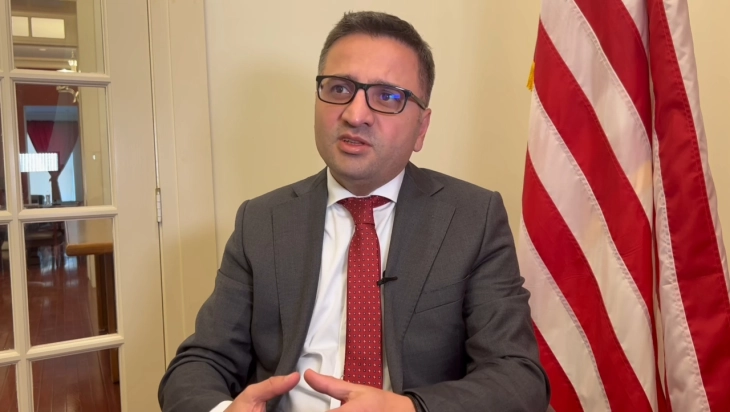Besimi: IMF’s Liquidity Line approval good signal for government policies, measures to be strictly targeted

Skopje, 13 October 2022 (MIA) – The IMF’s approval of the country’s access to funds from its Precautionary and Liquidity Line (PLL) is a good sign for the policies implemented by the Government during a time of crisis. The measures we have adopted in support of the citizens and the businesses led to a reduction of inflation by three percentage points in the first half of the year, the support will continue but it will be strictly targeted to the most vulnerable groups of citizens and businesses, Finance Minister Fatmir Besimi told Voice of America.
“In the beginning we introduced general measures to protect against the price shock, which were implemented quickly in the spring, as early as March. They concerned the reduction or abolition of taxes on some products, while at the same time limiting prices with trade margins. They had an effect in the short term and we managed to reduce the inflation by three percentage points in the first half of the year just from those measures. These are measures which in all reports by international institutions are used to eliminate the speculative effect on the market in a short amount of time, and this was achieved. Then they slowly transformed into targeted measures, which means that the burden is partially transferred through the budget and those most affected receive support, while the rest remains to the market, and we have been doing this throughout this entire period,” says Minister Besimi.
He states that we are currently facing a crisis that is very different from the one during the pandemic from an economic aspect, which is why we must have a fiscal consolidation as opposed to the pandemic when we had a monetary and fiscal expansion.
“Now there are monetary restrictions and there has to be fiscal consolidation, i.e., we must spend as little as possible and that spending has to be targeted. The support we are giving has to be strictly targeted in order to reduce the deficit. There is no other recipe. Everyone must be aware of what is happening on the world stage from the financial and energy aspect, and that if we offer support, it must be targeted,” says Besimi.
He underscores this is a serious crisis of global proportions and softening the blows using only the budget will not be enough.
“Citizens and businesses have to realize this. In order to be able to overcome this situation first we need the targeted measures, because the budget funds cannot be spent unsustainably. Secondly, the global financial markets are not only expensive, but they lack sufficient funds and that is another limiting aspect, and thirdly, we are also working beyond the targeted measures, on mid-term and long-term solutions for increasing energy efficiency, becoming energy independent, renewable sources of energy and increasing general awareness of saving electricity during this period. At the same time, we are also working on reforms which would represent a sustainable basis in terms of policies for sustainable growth in the coming period after the crisis,” says Finance Minister Besimi.
Regarding inflation, Besimi points out it is directly related to the events on the European market. He explains that it is a result of the fact that the Macedonian economy is much more open compared to the other countries of the region, and what happens on the European market, especially Germany, consequently is transmitted to us as well.
Minister Besimi says prices in 2023 are expected to stabilize and a stagflation is not expected, although, "growth will slow down, but will be there, and it is expected to be around three percent in 2022 and 2023. ad/ik/







